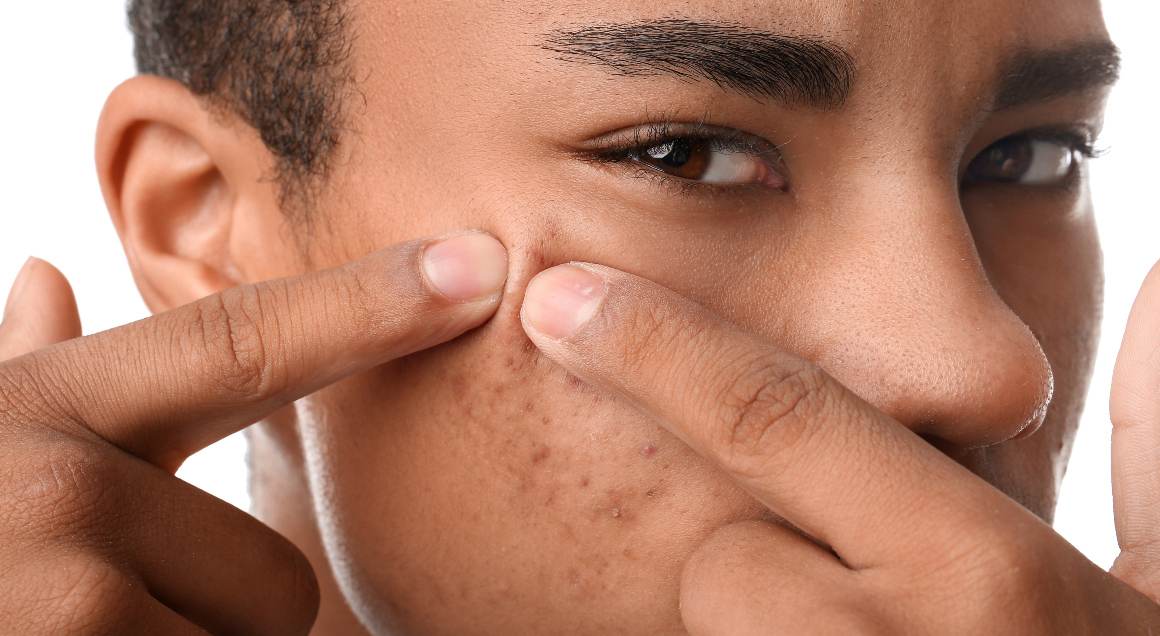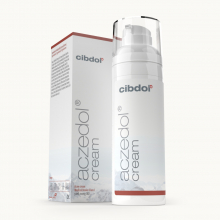Does Stress Cause Pimples?
Published:
Stress is a part of everyday life. But when it becomes chronic, it can wreak havoc on your health - including your skin. If you've noticed more breakouts and pimples during stressful times, you're not alone. Stress can exacerbate acne in a number of ways. Keep reading to learn more about the connection between stress and acne.
Contents:
- How Stress Affects Your Skin
- The Skin-Gut Connection
- How to Minimize Stress Breakouts
- Relaxation Techniques to Try
- Lifestyle Changes to Consider
- When to See a Dermatologist
- The Bottom Line
- Frequently Asked Questions on Stress and Acne
- What is the connection between stress and acne?
- How does stress worsen acne exactly?
- Can stress alone cause acne?
- What is the skin-gut connection relating to stress?
- Does stress cause all types of pimples and blemishes?
- Can stress cause sudden, severe breakouts?
- What’s the best way to prevent stress acne?
- How can you tell if your acne is stress-related?
- When should you see a dermatologist for stress acne?
- What lifestyle changes help prevent stress acne?
- Is there a link between gut health and stress acne?
- Can you completely cure stress acne?

How Stress Affects Your Skin
Stress causes your body to produce more of the stress hormone cortisol. This leads to inflammation, which can worsen acne. Stress also causes an increase in oil production. Excess oil clogs pores and contributes to breakouts.
In addition, high stress levels disrupt your hormone balance. This can increase sebum production and throw your skin's renewal process out of balance. The result? More clogged pores, irritation, and pimples.
Stress may also cause you to unintentionally make your skin worse. For example, you may pick at blemishes more or forget to stick to your regular skincare routine. All of these effects of stress can lead to flare-ups.
The Skin-Gut Connection
There is also evidence that stress can worsen acne breakouts through its effects on your gut health. Stress disrupts the balance of microbes in your intestines. An imbalance in gut bacteria is linked to inflammation, which we know can aggravate acne.
Stress may also impair your intestinal barrier function. This allows bacteria and toxins to escape into the bloodstream and cause systemic inflammation. By promoting inflammation from the inside out, stress can exacerbate pimples and skin problems.
How to Minimize Stress Breakouts
Now that you know the various ways stress impacts acne, here are some tips to prevent stress pimples:
Find Healthy Stress Relief
Make time for relaxing activities like yoga, meditation, or reading. Try journaling to process your emotions. Listen to music, take a walk outside, or spend time with friends. Find healthy stress relief strategies that work for you.
Get Plenty of Sleep
Not getting enough sleep is stressful on your body and can worsen acne. Aim for 7-9 hours per night. Having a consistent bedtime and wake time helps regulate your circadian rhythm for better sleep quality.
Exercise Regularly
Physical activity reduces cortisol and other stress hormones. It also increases endorphins to boost your mood naturally. Get at least 30 minutes of exercise per day.
Follow a Skin-Friendly Diet
A nutritious, anti-inflammatory diet can help fortify your skin against stress. Eat plenty of fresh fruits, vegetables, healthy fats and lean protein. Limit sugar and processed foods. Stay hydrated by drinking water throughout the day.
Take Care of Your Skin
Even when you’re stressed, stick to your regular skincare routine. Gently cleanse, use medicated acne products as needed, and moisturize. This provides a layer of protection against flare ups. Don’t pick at your skin - this can worsen breakouts.
Consider Stress-Fighting Supplements
Ask your dermatologist if supplements like probiotics, zinc or omega-3s could help fortify your skin against stress-related acne. Research shows they may help reduce inflammation.
Relaxation Techniques to Try
Making time to consciously relax is key for balanced stress levels and clear skin. Here are some effective relaxation techniques to try:
- Deep breathing: Inhale deeply through your nose, hold for a few seconds, then slowly exhale. Repeat for 5-10 minutes. This calms the nervous system.
- Progressive muscle relaxation: Tense and relax each muscle group one by one. This helps relieve tension.
- Guided imagery: Picture a peaceful scene like a beach. Engage all your senses. This takes your mind off stressful thoughts.
- Meditation: Sit quietly, focus on your breath, and return your attention gently when your mind wanders. Meditating for even a few minutes can induce relaxation.
- Yoga: Link movement with breathing during a gentle flow. Yoga lowers cortisol levels.
- Journaling: Write freely about your stresses, thoughts and feelings. This helps process emotions.
Find the relaxation methods that you enjoy and practice them often to keep stress in check. This will help minimize stress-related breakouts.
Lifestyle Changes to Consider
In some cases, effectively managing acne triggered by stress requires more than relaxation techniques alone. Here are some additional lifestyle changes to consider:
Improve your sleep habits. Get 7-9 hours of quality sleep per night. Stick to consistent bed and wake-up times. This regulates cortisol secretion to prevent hormone fluctuations.
Exercise more. Cardio and resistance training helps reduce acne-causing stress hormones. Aim for at least 30 minutes per day.
Eat a wholesome, anti-inflammatory diet. Focus on whole foods like vegetables, fruits, lean proteins and healthy fats. Limit sugar and refined carbs. Stay hydrated with water.
Take adaptogenic herbs. Herbs like ashwagandha, rhodiola and maca help your body adapt to stress. Research shows they may improve hormonal balance.
Consider cognitive behavioral therapy (CBT). CBT gives you tools to challenge unhelpful thought patterns that exacerbate emotional stress.
Practice self-care. Make time for relaxing bubble baths, self-massages, nature walks, or other activities you find calming.
Say no to extra obligations. Don't overcommit. Leave plenty of time for self-care.
Consider medication. For severe stress or anxiety, talk to your dermatologist about medication options.
When to See a Dermatologist
If you think stress is causing or worsening your breakouts, make an appointment with your dermatologist. They can help identify underlying causes and devise a treatment plan. Be ready to talk about any major stress factors in your life.
Your dermatologist may prescribe topical or oral medication to treat acne. They may also refer you to a therapist for help managing stress levels. Getting professional support is key for addressing the root cause of stress pimples.
The Bottom Line
Stress can worsen acne breakouts in several ways. It increases inflammation, disrupts hormone balance, and negatively impacts gut health. Managing stress is crucial for clear skin. Relaxation techniques, lifestyle changes, and professional treatment can help prevent pimples caused by high stress levels. Pay attention to your body’s signals, and take action when needed to keep stress in check.
Frequently Asked Questions on Stress and Acne
What is the connection between stress and acne?
Stress causes your body to produce more cortisol and other hormones that increase inflammation and sebum (oil) production. This disrupts the skin's renewal processes and creates an environment that fosters breakouts. Stress also impairs gut health, which can further contribute to inflammatory acne.
How does stress worsen acne exactly?
In several ways. First, it increases inflammation, which aggravates acne. It also ramps up oil production, leading to more clogged pores. Stress disrupts hormone balance, causing fluctuations that contribute to breakouts. It may also impair your skin barrier and intestinal barrier function. A weakened barrier allows bacteria and toxins to escape into the bloodstream, causing more systemic inflammation.
Can stress alone cause acne?
For some people, yes. In those prone to acne, increased inflammation from chronic stress can trigger breakouts on its own by disrupting the skin’s renewal processes. However, stress more commonly worsens existing acne rather than directly causing it altogether.
What is the skin-gut connection relating to stress?
Stress impacts the balance of microbes in your gut, causing more inflammation-promoting bacteria to grow. Leaky gut syndrome also allows bacteria and toxins to escape into the bloodstream and cause widespread inflammation when you’re stressed. This internal inflammation can surface on the skin as acne.
Does stress cause all types of pimples and blemishes?
Yes, stress can worsen all types of acne, including whiteheads, blackheads, papules, pustules, nodules, and cysts. Stress-related breakouts are usually inflammatory lesions like papules, pustules, nodules and cysts. But increased oil production can also clog pores and cause non-inflammatory comedonal acne.
Can stress cause sudden, severe breakouts?
Yes. Flare-ups related to stress often come on suddenly and severely. This is because stress rapidly increases inflammatory hormones like cortisol. For example, many people report breakouts within days of a very stressful event. Breakouts may involve numerous inflammatory lesions.
What’s the best way to prevent stress acne?
Managing your stress levels through relaxation techniques, lifestyle changes, medications, and/or therapy is the most effective way to prevent stress pimples. Maintaining a consistent skincare routine also provides a layer of protection when you’re stressed.
How can you tell if your acne is stress-related?
If it worsens during stressful times, comes on suddenly, or involves inflammatory lesions like papules and pustules, stress may be a factor. Keeping a skin journal to record flare-ups and stress levels can help you identify triggers. Seeing a dermatologist can also help diagnose stress as an underlying cause.
When should you see a dermatologist for stress acne?
See your dermatologist if you notice an association between higher stress and increased breakouts. A dermatologist can help uncover and address the root cause. They may prescribe topical or oral acne medications, refer you to a therapist for stress management, or suggest lifestyle changes to prevent stress pimples.
What lifestyle changes help prevent stress acne?
Exercising, following an anti-inflammatory diet, practicing relaxation techniques, improving sleep habits, taking adaptogenic herbs, and spending time on self-care are some effective lifestyle changes for minimizing stress and acne. Reducing obligations and saying no to added responsibilities also help minimize stress levels.
Is there a link between gut health and stress acne?
Yes. Chronic stress negatively affects gut microbiome balance, impairing digestion, metabolism and immunity. This gut-skin axis allows inflammation that originates in your intestines to eventually manifest as skin problems like acne. Probiotics and a gut-healthy diet help maintain intestinal health to prevent inflammation.
Can you completely cure stress acne?
For some, managing stress and lifestyle factors alone clears up stress-related breakouts. But for moderate to severe acne, medications or procedures prescribed by a dermatologist are often needed in conjunction with stress reduction. This combined approach provides the best chance at completely curing acne worsened by stress.
















